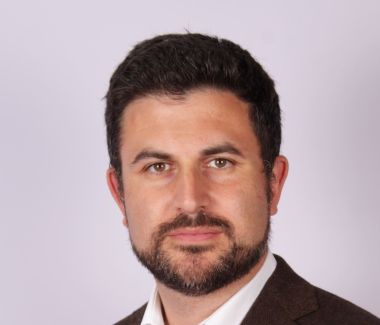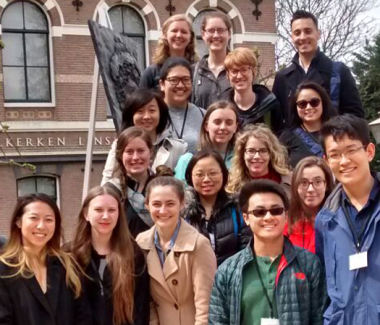Project supervisors
What is EuroScholars?
EuroScholars is a unique program, offering talented undergraduates (with a minimum GPA of 3.4) from US or Canadian institutions the opportunity to do research for a whole semester, or even a year. Students will be part of an international research group, conducting research under supervision of a professor at one of the best European Research Universities. The research is accompanied by an independent literature study (and an elective, if applicable) and is combined with a language and culture course and a European orientation program, called the Midstay Program (2-3 days) in a European city.
Your role in the EuroScholars Program
All Research Project Supervisors have an active and important role in the guidance of the EuroScholars students.
A description of what we expect from the supervisor and the procedures can be found here.
The Research Project
The main element of the EuroScholars program is the Research Project. Most available Research Projects are existing projects in which the EuroScholars student is invited to participate. Together, the European universities offer about 100 research projects through the EuroScholars database Projects are available in Arts and Humanities, Performing Arts, Biology, Chemistry, Engineering, Mathematics, Physics, Astronomy, Computer Science, Medicine, Biomedical Sciences, Law, Economics, Management, Politics and Social Studies. The other part of the curriculum is built around the Research Project in dialogue with the supervising professor.
Flexible curriculum
The EuroScholars program offers a flexible curriculum individually built around each student's academic needs. The curriculum is established in dialogue with the professor supervising the Research Project (the central element of the curriculum). This makes the program unique for every student. This flexibility means students will have less difficulty in integrating the EuroScholars curriculum into their US curriculum and students can make the best use of the opportunities host institutions offer in combining research with coursework.
Two options
There are several standard elements in the curriculum regardless of the host university: a Language & Culture Course/s (classes), a Methods & Literature Review (independent study) and the Research Project (including a paper or article). The Language & Culture Course/s will give the student basic knowledge of the language and culture of the host country. In most institutions the student will enroll in a regular scheduled course with other international students. The Methods & Literature Review (info sheet) will provide the student with the opportunity to best contribute to the Research Project by independently reviewing scientific literature on the area of research.
EuroScholars proposes 2 different basic curriculum options to assure that the characteristics of the program are best represented (academic research and language and/or culture). Students earn up to a maximum of 30 ECTS for one semester of participation. The credits per component and for the full program will vary. A full-time credit load must be maintained by the student. Whether a student chooses option 1 or 2 also depends on if the preferred host institution offers courses in English in the field of study in that specific semester. The basic element is always the participation in the Research Project. Info sheet Research Project
Option 1
- Language & Culture Course/s (classes + exam)*
- Participation in Research Project including article/presentation/paper, including Methods & Literature Review
Option 2
- Language & Culture Course/s (classes + exam)*
- 1 Elective course in the field of research (classes + exam)**
- Participation in Research Project including article/presentation/presentation
* At most of the European Host institutions, the Language course is provided by a Language Center which has a collaboration with the university but is not part of the university. Therefore, some North American institutions might not accept the credits for the language course. Students are strongly advised to check this with their study advisor before setting up the learning agreement. If applicable, the student can request the Research Project Supervisor to add extra elements to the research project in order to earn the missing credits in order to meet the requirements of the home institution.
** At some European Host institutions, the credits for the elective course are higher or lower than the aforementioned 2-8 ECTS. Students are strongly advised to check this with their study advisor and Research project supervisor before setting up the learning agreement in order to meet the requirements of the home institution. The number of credits can then be adjusted if applicable.
European Credit Transfer System (ECTS)
Credits are given in ECTS at almost all European universities. 30 ECTS represents the workload of a semester of full-time study. 1 ECTS equals 28 hours of study, including preparing for and attending classes, reading books, writing papers, studying for tests, presentations and exams. ECTS are awarded if all examination requirements that have been set beforehand have been met. The number of ECTS varies per course or project.
For EuroScholars students the number of ECTS per program element are specified and confirmed through the Learning Agreement. Where a student is not participating in an existing course, with set examination requirements, clear agreements should be made and formalized in the Learning Agreement.
Learning Agreement & credit transfer
The curriculum, examination requirements and credits to be awarded for successful completion are formalized in the Learning Agreement. The document will be completed by the student and signed by four parties: the student, the research supervisor, the home institution and the host institution (for general approval). The Learning Agreement will thus be the basis for credit transfer.
After completion of the semester abroad, the student will receive an official transcript from the host university, listing the course(s) and research taken and grades and credits received during the study period. With the transcript, credit transfer can take place.
IMPORTANT: students must be attached to a US or Canadian home institution while participating in the program. The student's home institution must complete the Learning Agreement after acceptance into a project, even if credits will not be transferred to that institution. Some specific projects may list additional requirements in their project descriptions. Transfer of credits is decided by the students' home institution.
Start & end date
The academic calendars vary at the different EuroScholars universities. In general a student applies for the Spring or Fall Semester. But individual arrangements can be made and may, for example, depend on when the Language & Culture Course/s is/are offered.


